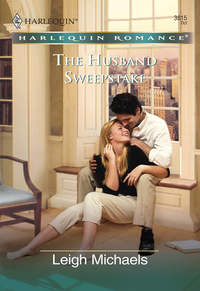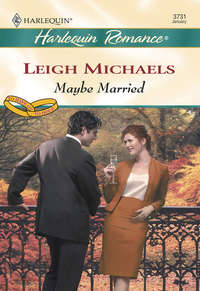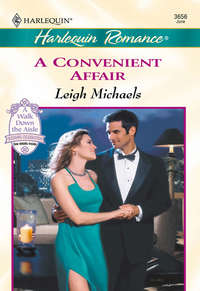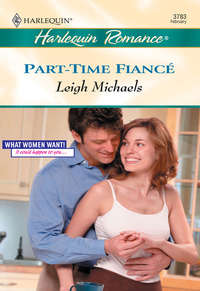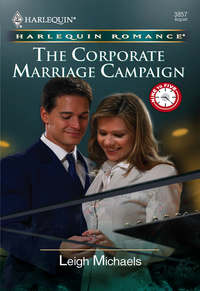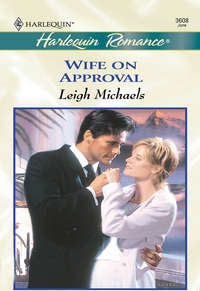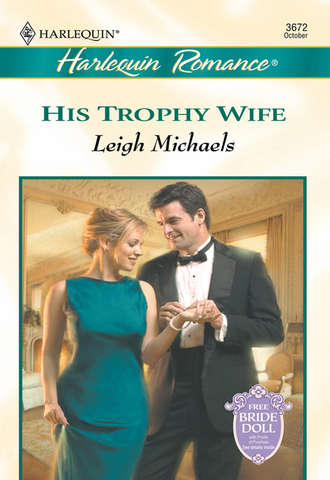
Полная версия
His Trophy Wife
“That’s a full-time job?”
“No, the rest of the time I’ll be selling women’s sportswear. It’s a start.”
She knew that despite her best efforts, she sounded tired and depressed. In a department store sales job, it would be decades before she could make a dent in her father’s debts.
He said slowly, “I may have a better idea.”
“I’m listening.” Morganna shrugged. “Though I have to admit I not only don’t see how you can help, I don’t understand why you should want to, either. If you knew my father at all—”
It was apparent that he heard the question in her voice. “As a matter of fact, I never met him.”
And then, while she was still trying to fathom why he seemed to feel responsible for her welfare and Abigail’s, Sloan Montgomery had looked her in the eye and asked her to marry him.
Morganna didn’t remember fainting. The next thing she knew, she was sitting on the floor, her shoulders cradled in Sloan’s arms, her nose resting against the soft lapel of his suit jacket, breathing in the delicious aromas of wool and soap and aftershave. The moment she was aware, however, she began to struggle, trying to get to her feet.
“Just sit there for a bit,” he said. “The last thing you need to do is fall down again.” He supported her till she could sit up by herself, and then he perched on her work stool, looking down at her. “Apparently my suggestion came as a shock.”
“That’s putting it mildly.” Morganna wriggled around to brace herself against the cabinet which supported the miniature house. “Whatever makes you think I’d be interested in marrying you?” She saw his jaw tighten and added hastily, “I didn’t mean that the way it sounded. It’s just that we hardly know each other. The idea of getting married—”
“I think we know enough. I know, for instance, that the Ashworth name opens every door in Lakemont society.”
“Not for much longer,” Morganna said wryly.
“That’s true.” His voice was cool. “Unless you act quickly to limit the damage from your father’s peccadilloes, a hundred years’ worth of family history will go down the drain and you’ll be an outcast.”
“Do you think I care about that? My real friends—”
He didn’t raise his voice, but his words cut easily across her protest. “And so will your mother.”
Morganna bit her lip. It wasn’t that her mother was shallow, she wanted to say. But it would be even harder for Abigail to start over than it would be for her daughter.
Morganna had already noticed how many people who should have come to offer their sympathies had stayed away instead. She didn’t think that fact had occurred to Abigail yet, but she knew that when it did, the realization would be devastating. Even the poverty they faced would be easier for Abigail to deal with than the humiliation of losing the only way of life she’d ever known.
“Do you think I haven’t tried to figure out a way?” she said wearily. “I can’t simply conjure up enough money to bail us out.”
“But I can.”
She stared up at him. “Why would you want to?”
He looked across the room, over her head, and said calmly, “I don’t suppose you’ll find this flattering.”
He’d been dead right on that count, of course—for what he’d told her then hadn’t been complimentary in the least. He’d made it plain that it was not Morganna he was attracted to, but her social standing. With an Ashworth at his side, he’d be at the highest rank of Lakemont’s society, and he would have achieved the final detail of the goal he’d set for himself as an impoverished kid years before—his own business, a few million in the bank, a position of respect in the community, a wife other men would envy him. Morganna was the ultimate piece in the puzzle he’d set himself to complete.
“So,” she’d said, when the orange glow of her fury had finally dissipated enough that she could trust herself to speak without screaming at him, “it’s not really a marriage you’re proposing, it’s a straight-out trade. Your money for my name.”
“That’s the deal.”
“Usually, you know, it’s older guys who have divorced their first wives who are looking for a trophy to display.”
“Sorry to violate the rules, but I was too busy fifteen years ago to find someone unsuitable to marry, just so I could discard her now in order to acquire you. You don’t appear to have any time to lose, Miss Ashworth. Are you interested or not?”
Morganna raised her chin and looked him straight in the eye. “Let me make this perfectly clear. For myself, I wouldn’t consider this proposition for an instant. It’s an insult and I’d live in a cardboard box and eat cat food for the rest of my life before I’d make a deal like that.”
“But you have your mother to consider.”
“Exactly. So convince me that what you’re offering her is worth the price you’re asking.”
Sloan had convinced her. And he’d kept his word. The day Morganna married him, he’d taken over the responsibility for Burke Ashworth’s debts, down to the last penny. And at the wedding breakfast, he’d handed Abigail a cashier’s check—he’d told her it was the face value of her husband’s life insurance policy—which would be adequate to keep her in comfort for the rest of her days.
Remember that moment, Morganna told herself. No sacrifice was too great a price to pay for the relief that had gleamed in her mother’s eyes at that instant.
And no sacrifice was too great to preserve Abigail’s peace of mind, even if it meant that Morganna had to spend every instant of the four weeks playing the part of a loving wife. Heaven knew she had perfected that role with her friends during the last six months—but performing for her mother would be a whole lot trickier.
It might be a challenge, Sloan had said, for her to pretend to be deliriously happy. Well, he’d hit that one on the nose.
Deliriously happy. By the time the month was over, Morganna thought morosely, she’d be lucky if she wasn’t simply delirious.
CHAPTER TWO
SLOAN dropped an ice cube into a glass and added a generous splash of liquor. “Here you go, Joel. Scotch on the rock—singular—just the way you like it.” As he strolled toward the fireplace to hand over the drink, a log burned in two with a crack, and a shower of sparks surged up the chimney and flared against the fire screen. “Dinner will be in just a few minutes, but in the meantime you can bring me up to speed on what’s been going on at Sticks & Stones while I’ve been away.”
The controller didn’t seem to hear. Though he took the glass, Joel continued to stare at the portrait in oils that hung above the drawing-room mantel. Following his gaze, Sloan contemplated the modernistic portrayal of Morganna—a much younger Morganna, hardly out of her teens—wearing a formal white satin gown, topped with a wine-colored velvet robe and an elaborate, glittery crown, which seemed much too heavy for her slender frame.
Reel in your tongue, Joel, he wanted to say. “That was painted the year she was Queen of the Carousel Ball.”
Joel seemed to pull himself back from a distance. “Is that the big dance where all the year’s debutantes are introduced?”
“And paraded around like merchandise,” Sloan agreed.
“It’s a beautiful picture.”
Sloan looked at the portrait again. He found it fascinating that Joel liked it. Sloan had never been fond of the painting, himself, but he hadn’t ever taken the time to figure out why. Was it the artist’s style that turned him off? Generally he liked his art a little more realistic-looking. Or was it the too-fancy costume, which in his opinion made Morganna look like a child playing dress-up in her mother’s clothes? Or was it perhaps the fact that the painting was from a time before he’d met her, a time when Morganna’s world had been so far separated from his that there was no point of intersection?
Not that it mattered, of course; the painting was ancient history now. He hardly even noticed it anymore, except when someone like Joel commented. He turned his back to the portrait and leaned against the mantel, enjoying the warmth of the fire. “How have things been going at the factory while I’ve been away?”
Joel sipped his drink and settled into a chair beside the fire. “Well, there are several matters you need to know about. I got my hands on an advance copy of Furnishing Unlimited’s next catalog.”
Sloan’s eyebrows raised. It was difficult even to get hold of a solid rumor about a head-to-head competitor’s new products, but to have full information even a few days in advance of the formal announcements, set out in the competitor’s own literature, was truly a coup. “How did you manage to pull off that one?”
Joel reached into his briefcase, propped against the chair leg, and handed over a slick magazine-size booklet. His voice was prim. “I really can’t talk about my source.”
Which no doubt meant, Sloan thought, that some woman on Furnishing Unlimited’s payroll had slipped it to him. Obviously it wouldn’t do to underestimate Joel; apparently a guy could be a ladies’ man even with a calculator clipped to his belt and a pocket protector full of pens and pencils. “I wouldn’t dream of asking for the details,” he said dryly.
“They’ve developed a couple of new lines I thought you should see. I marked the pages for you.”
Sloan flipped open the booklet, pausing at places where Joel had placed a sticky note, to look at Furnishing Unlimited’s new line of modernistic office furniture. “This looks a bit like our current designs.”
“That’s what I thought. They haven’t exactly done anything shady in adapting what Sticks & Stones did last year. But I believed you should know what they were up to, before it actually hits the market.”
“I doubt they’ll be able to lure our customers away with poor imitations of our designs, but you’re right about the value of a warning. Put yourself in for a raise, Joel.”
“Thank you, sir. I’ll do that.”
Sloan continued to flip pages. “You said there were several things to bring to my attention.”
“We had to suspend a couple of workers this week. It seems they were running a business on the side, while they were on our time clock. The union steward was quite unhappy with the suspension action and is protesting it. And the men themselves, of course, were livid at being caught.”
In the hallway outside the drawing room, a flutter of blue silk caught Sloan’s eye. “I’ll call all of them in tomorrow morning and get it settled,” he said absently.
A moment later Abigail Ashworth appeared in the doorway. “Sloan, my dear,” she exclaimed. “I’m so glad to have a moment with you before Morganna comes down. I feel I should apologize for my bad timing, though, popping in on your first night at home.” Joel rose from his seat, and Abigail’s eyes narrowed. “I beg your pardon, I thought you were alone.”
“You remember my controller, Joel Evans?” Sloan said, and she nodded. “A glass of wine, Abigail?”
“That would be lovely, dear. You know, it’s awfully good to be home—I could almost thank Robert for making my life so stressful that I couldn’t wait to get out of Phoenix. I’m sure Morganna has told you my silly reason for being here.” She looked expectantly up at him.
He was just opening his mouth to answer when, from the doorway, Morganna said hastily, “Actually, I haven’t had time, Mother.”
Sloan’s momentary irritation at her interruption—didn’t she think he could handle her mother?—gave way to a wicked impulsiveness. “First things first,” he murmured. “I’m sure you understand, Abigail, that there are certain…priorities…when a newly married couple is reunited after a time apart.”
He watched in fascination as Morganna’s face went pink. He was reasonably sure that the cause of her heightened color was pure fury at him for the suggestive comment, but it was equally apparent to Sloan that the onlookers had interpreted it differently. There was a naughty but appreciative gleam in Abigail’s eyes, while Joel shifted his feet and looked thoroughly embarrassed.
Sloan reached inside his jacket and pulled out a long, slender, black velvet box. “That reminds me, darling. Since I had other things on my mind earlier, I forgot to give you the anniversary gift I brought you from San Francisco.”
Morganna shook her head. “It’s not our anniversary.”
“Yes, it is. It’ll be six months next week since our wedding.” He held out a hand in summons, and watched her closely as she slowly crossed the room toward him. Though he was certain Joel and Abigail saw only a pretty hesitancy at claiming her gift, Sloan couldn’t miss the bone-deep reluctance with which she moved. She’d have been more eager, he thought, to approach the guillotine.
Her dark green dress was one he’d seen her wear at least a dozen times before, and he idly wondered which point she was trying to make tonight by wearing it instead of something new. Was she emphasizing her reluctance to shop for clothes because spending his money left her feeling even more in his debt? Or was she subtly pointing out that she didn’t think he was worth dressing up for?
In public, where her friends or his business associates might notice, she was always a fashion plate, elegantly garbed and groomed and seldom wearing the same dress twice. If he’d remembered to tell her earlier that Joel was coming for dinner, Morganna would no doubt have come downstairs looking as if she was off to the Carousel Ball immediately after dessert. Sloan had suspected on occasion that she was actually trying to look like a caricature of the leader of society he’d said he wanted her to be.
In private, however, things were different. Though to a casual onlooker she would always have appeared just as neat and well-turned-out, she was in fact far less elegant. She wore the same few dresses—all ones she had owned before their wedding—and she ignored the stock of jewelry with which he’d supplied her.
Probably, he thought, she would like him to believe that on the nights they dined alone she was in the habit of simply seizing the first thing she touched in her closet, without even noticing what it was. In fact, he thought it was more likely that she deliberately planned what she wore, and how often, in the hope of annoying him.
Not that her campaign of irritation would succeed. It didn’t matter to Sloan if she wanted to wear the same dinner dress for the next thirty years—especially if it was this particular dress, which hugged her figure with its deceptively demure shape and enticed despite an innocently high-cut neckline. He suspected if Morganna had any idea precisely how attractive he found that dress, she’d have donated it to the thrift shop long ago.
“That old thing again?” he murmured as she came within arm’s length. He took her hand and drew her closer, till his lips brushed across her cheek. “Your wardrobe is becoming incredibly boring, my dear.”
She said under her breath, “I’ll keep your objections in mind.”
“Meaning that you intend to go right on wearing the same old clothes. Perhaps I should mention the problem to your mother.”
“You wouldn’t.”
“Don’t push me.” He laid the velvet box across her palm and let a husky note creep into his voice. “Happy anniversary, darling.”
He saw the flash of irritation in her eyes, but obediently Morganna unsnapped the box and lifted the lid. Inside, on a bed of black satin, lay a river of fire—a bracelet of diamonds too numerous to count, perfectly matched and set into a braided chain of platinum that had made him think of her pale blond hair.
Irritation had given way to dismay, he saw as she raised her gaze to meet his. Her eyes were stormy blue-gray, and one crystal tear clung to her dark lashes. “Stop this,” she whispered. “Stop torturing me.”
He bent closer. “It’s a gift, Morganna.”
“It’s a ball and chain, and you know it.”
He lifted the bracelet from the box. “Would you rather put it on or explain to your mother why you don’t want to wear it?” He watched her swallow hard before she held out her hand. He fastened the bracelet, then raised her wrist so he could press his lips against the pulse point. Deliberately he pitched his voice just above a murmur—suggestively low, but just loud enough for the two onlookers to hear. “I’ll wait to get my real thank-you later, when we’re alone. Now, I think Selby is making signals about dinner. Shall we go in?”
The bracelet seemed to weigh a thousand pounds, and every time Morganna raised her fork, the diamonds on her wrist caught the light from the chandelier and shattered it into knife points that hurt her eyes.
Six months, she thought. It would be six months next week since the wedding. Since the first and most ostentatious of the gifts.
She had been taken completely off guard at the wedding breakfast, when Sloan, after giving Abigail her check, had handed Morganna an envelope containing the deed to the Georgian-style mansion—a legal document detailing that the property now belonged jointly to Sloan Montgomery and Morganna Ashworth Montgomery. Husband and wife.
“Just a little wedding gift,” he’d said, and Abigail had exclaimed in delight at the idea that her daughter’s childhood home and the multitude of treasures it contained were now Morganna’s to keep.
Morganna herself had shuddered at the thought—not because she didn’t want the house, for she had shed tears over the thought of losing it, but because the image of debt piling upon debt made her stomach churn. Only then did she realize that somewhere in the back of her mind she had cherished the vague hope of being able one day to pay back the money he had provided for her mother, so she could be free of Sloan Montgomery. But how could she ever be free if she, too, took from his bounty?
Under her breath, without looking at Sloan, she’d said, “I didn’t ask for anything from you. And I won’t take anything from you.”
Sloan had leaned across her to top off her already-full champagne glass. “That’s your tough luck, Morganna, because I’ll give you anything I damned well want to.”
In startled silence, she had turned to stare at him.
“I understand quite well that you’d prefer being a martyr to accepting my gifts. Living in a cardboard box and eating cat food—wasn’t that what you told me you’d sooner do than marry me?”
Morganna’s voice was taut. “Don’t expect me to believe you did this out of fondness for me. You only put my name on this deed to impress my mother. If you’d been doing it for me, you’d have made the house mine entirely.”
“I could have wiped out your father’s debts outright, too, instead of promising to pay them off over the next couple of years. But do you think I’m such a fool that I’d hand you everything you want at a swoop in return for nothing but a promise? We made a deal, Morganna. Now that you’re my wife, you have an image to maintain, and part of your performance is to graciously accept the generous gifts of your seemingly smitten husband. Get used to it.”
She’d had six months to become accustomed to Sloan’s way of doing things, but it hadn’t made a difference. Six years wouldn’t change things, either, she thought wearily, if—God forbid—it came to that.
It wasn’t that his gifts were garish or ill-chosen. Showy as the diamond bracelet was, it was in perfect taste; the quality of the stones was what made the bracelet so attention-getting, not a flashy setting. It was the motivation behind the gifts that Morganna found so hard to swallow, and the fact that her wishes didn’t enter into his plans at all.
And why should she expect him to consult her, she wondered bitterly. It would be silly to ask a department-store dummy what she wanted to wear; a plastic mannequin had no opinion. And, it was all too clear to Morganna, that was precisely how her husband viewed her. She was nothing more than a prop in his magic show—a bit of stage dressing to help convince the audience how stupendous her husband was.
So Morganna did what she had to do. In public she was the perfect trophy, smiling and happy, wearing diamonds Sloan had chosen and designer clothes purchased with his money. In private, she wore what she liked. And if he was tired of seeing her hunter-green dinner dress, that was just his tough luck, because she intended to wear it till it was threadbare. Fortunately it was one of her favorites; if she’d hated the dress she might not have been as eager to annoy him with it.
After dinner the men excused themselves to finish their business discussion, while Morganna and Abigail returned to the drawing room to sit beside a freshly stoked fire. Morganna hardly noticed the passage of time or the drift of the conversation until her mother said, “I expected by now you would have redecorated the drawing room, Morganna.”
“I think it’s fine the way it is, Mother.” And to redecorate would simply add one more item to the list of things I owe Sloan.
“Don’t be silly, child,” Abigail said flatly. “I know for a fact that you’ve always disliked the dark hangings that I put in here. And I have to admit, at this time of year and with winter closing in, it’s a gloomy sort of room—not at all the cozy feeling I was trying to achieve. Perhaps the depressing atmosphere in here is why you seem to be drooping tonight.”
Morganna seized the excuse. Tomorrow, she thought, I’ll be able to handle this. But not tonight. “I was hoping it didn’t show—but I am tired, Mother. If you don’t mind, I think I’ll go on up to bed.”
“I don’t mind at all, dear. I’ll just walk up with you and get my book.”
At the foot of the stairs, Abigail paused. “Aren’t you going to say good-night to your husband?”
The very question startled Morganna, and she had to stop and think about how a normal married couple would act. That reaction alone showed how shatteringly peculiar their situation was, she thought. “I’m sure he’d rather not be disturbed, Mother. When he’s talking business with Joel—”
“Nonsense,” Abigail announced, and before Morganna could protest she’d knocked at the library door and pushed it open.
Sloan paused in the middle of a sentence and looked inquiringly at them. “Sorry to interrupt,” Morganna said, more abruptly than she’d intended. “I just wanted to say good night.”
She was already backing out of the doorway when Sloan moved toward her. “Is it so late? I’m terribly sorry, darling.” He looked over his shoulder. “We’re almost finished, aren’t we, Joel?”
The controller shook his head. “I’m afraid not. There’s still the matter of updating all the property insurance on the factory, and there’s also a customer problem that came up while you were gone.”
Sloan shrugged. “Then it will be a little longer, Morganna. In case you’re asleep by the time I come upstairs—” He slipped one arm around her shoulders, and with the other hand he cupped her chin and raised her face to his.
Morganna had opened her mouth to object before she thought better of it, so her lips were parted when he kissed her. She tensed at the first brush of his mouth, panic rising in her. Even at their wedding, he hadn’t touched her this intimately, and every cell in her body shrieked in protest.
As her reluctance surged, Sloan’s arms tightened, drawing her even closer. Though she knew his embrace must have looked like that of an experienced and welcomed lover, Morganna couldn’t mistake the steel that held her fast. She couldn’t have broken free from his hold even if his kiss, soft as the graze of a butterfly’s wing, hadn’t turned her knees the consistency of oatmeal.
She was trembling by the time he let her go, and he steadied her for a moment with both hands on her shoulders. “Unquestionably,” he said huskily, “I’ve been gone from home much too long.”
By the time he finally got Joel out the door, the house was quiet. Even the butler had taken Sloan’s advice and gone on to bed. Yawning, Sloan scattered the embers in the library fireplace, put the last of his papers in his briefcase and checked the locks before he climbed the stairs.
In the upper hall, he paused for a moment to listen to the silence and looked thoughtfully down the hall to the closed door of Morganna’s bedroom. Though that good-night kiss had been intended as pure theater, it had not remained a simple performance for long. But he hadn’t had enough time to fully assess Morganna’s reaction to the embrace. At first she had been annoyed, certainly, and reluctant—those feelings had exuded from every muscle as he’d held her. But there had been something else as well, something he hadn’t quite been able to identify before he’d had to let her go. It wasn’t anger that had made her go weak in the knees. Had it been the faint flutter of desire?—or had he merely seen what he wanted to see?


